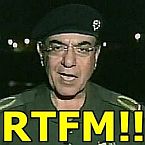ColinWright
Posts: 2604
Joined: 10/13/2005
Status: offline

|
quote:
ORIGINAL: KoenigMKII
quote:
ORIGINAL: ColinWright
I think that the thing about Seelowe is that while one can plausibly rearrange history to give it a fair chance of success, it remains a hair-raisingly risky proposition from the German point of view almost no matter how one stacks the deck.
This was in fact more or less Hitler's take on it. It would be an operation to be undertaken if Germany was in a desperate situation, and Germany was not in a desperate situation. That was the gist of what he had to say on the subject.
Rationally, the thing to do upon the fall of France was not to attempt Seelowe, but to methodically isolate England and render her position untenable. Bring Spain in, eliminate Gibraltar, and use Ferrol to increase the threat to her sea routes. Make concessions to the French to gain the use of Dakar and Syria. Encourage Japan to attack her holdings in the Far East. All these powers were quite willing to cooperate with Germany in the early summer of 1940 -- Hitler all but ignored them. The most extreme example would be his reply to Japan's overtures along these lines: 'harvest help not needed.'
Hitler didn't need or even want to conquer Britain -- just to force her to acquiesce in his plans. I think a solid case can be made that all the steps I have mentioned above were eminently achievable -- and I think the pressure on Britain could have been racheted up to the point where it would have been unbearable. Moreover, note that the actual resources Germany needs to commit to follow the above course are minimal.
However, Hitler didn't even do this much. Rather, he halted in puzzlement when Britain failed to agree he had won the war, hemmed and hawed, tried to scare her with the threat of invasion, and then turned to the more congenial task of plotting the destruction of Russia. Largely, he thereafter simply ignored Britain as much as possible -- never pursued a coherent policy with regards to her at all.
Of course, none of this means Seelowe is an operation that never could have happened. Hitler was not famously rational, and given a different attitude on his part towards Britain, simply invading her would have been very appealling. After all, if successful, an invasion would certainly deliver quick results, and there'd be no nonsense about negotiating a settlement. Moreover, after the fall of France, German morale and self-confidence was sky-high. They might have had a go.
Colin, I agree with your post above. A question for you, if I may, one thing that bothered me is that the Luftwaffe air bases in the Historical battle of Britain seemed to be deployed quite far back, to make surprise counter-air attack impossible for the RAF.
Well, by the height of the Battle of Britain, most of the Luftwaffe's Bf-109's were jammed into the Pas de Calais. The bombers had sufficent range so that they could just use the various major airfields already in existence in France and the Low Countries.
The British did try some night bombing of German airfields during the Battle of Britain. These raids had little effect. The results of their attempts at daylight bombing were so uniformly disastrous in 1940-41 that I'm not sure the Luftwaffe would have exactly objected to a more serious effort. One strike lost all eleven of eleven bombers sent out.quote:
If Seelowe had been launched, possibly pinning the RAF above the channel to defend the RN, that makes the two sides more equal in combat endurance/range. The Luftwaffe had more experienced pilots, thats going to hurt the RAF. If the RAF loses air superiority to the Luftwaffe over the channel, then its down to the RN to go on alone, is there a period of days of moonlight in early september that could have been used to uncloak the RN?
In Bright moonlight with perfectly clear skies its even possible to hit ships. The Dambusters raid was conducted in strong moonlight at low level, making it a double surprise. I don't have the moonlight tables for that period - do you know where such information could be found?
Manstein really was a clever and highly skilled commander he must of considered these factors, thats the only reason I can think of for him to say "we should have tried it."
First, I'm not sure a full moon would be a guarantee of much of anything: even at the height of Summer, about half of all days were cloudy, and so, presumably, would be the nights.
Then there are the demands that high tide fall at the right time for a dawn attack, and of course, that the Germans have completed their preparations, gained the requisite air superiority, etc. As it was, you're talking about two-three conceivable five-day windows in the period August-September. Add a requirement for a full moon and you may have just talked yourself out of making the attack at all.
Manstein did indeed say Seelowe should have been attempted: but it's important to realize that he never conducted an amphibious operation in his life. I'm not sure he qualifies as an expert. The army in general had a nasty habit of approaching the whole operation with the attiude that their responsibility began only once all the troops were safely ashore in Britain: getting them there was the navy's problem. Given that, of course Seelowe should have been attempted. The navy does its job, and it's all a snap.
_____________________________
I am not Charlie Hebdo
|
 Printable Version
Printable Version








 He also has done a Seelöwe scenario that is said to be soon released.
He also has done a Seelöwe scenario that is said to be soon released.


 New Messages
New Messages No New Messages
No New Messages Hot Topic w/ New Messages
Hot Topic w/ New Messages Hot Topic w/o New Messages
Hot Topic w/o New Messages Locked w/ New Messages
Locked w/ New Messages Locked w/o New Messages
Locked w/o New Messages Post New Thread
Post New Thread